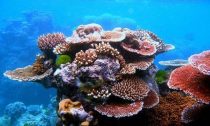
As announced by the United Nations data on climate change, 30 percent of carbon dioxide produced by humans is absorbed by oceans, which endangers the maritime live. However, some maritime creatures of the northern Red Sea stand defiant against the increasing temperatures of oceans and seas.
Unlike all kinds of coral reefs all over the world, coral reefs in the northern Red Sea stand defiant against ocean warming even if the sea water temperature increases by 6 °C in the summer, Professor of Marine Environment in the Faculty of Science at Al-Azhar University Eslam Osama told Egypt Today.
“No coral bleaching was recorded in the northern Red Sea over the past three decades and that indicatesthat coral reefs in this area are less sensitive to high temperature,” said Osama, who conducted a study published in 2017 by Global Change Biology on Coral bleaching refugia of the northern Red Sea, in cooperation with coral reef ecologists from Saudi Arabia, the UK, and Australia
Coral bleaching is a process that happens when the coral reefs’ color turns white due to being stressed by the warming up of oceans. According to the US National Ocean Services, coral bleaching does not mean the mortality of reefs; it is dying butcan survive.
As per the study, which was conducted in 2015/2016 in 11 sites along the Red Sea, coral bleaching was recorded in central and southern areas of the Red Sea, unlike the northern part, where reefs can live even if the temperature reaches 32 °C.
It is expected that the ocean temperature increases 2-3 °C by 2100, while the average temperature of the northern Red Sea is 25-28 °C degrees. So, the northern Red Sea will be the last safe shelter for coral reefs on earth, Osama continued.
“More than 50 percent of coral reefs all over the world died over the past three decades due to many factors, including climate Change,” he said.
The Red Sea is inhabited by fringing reefs, which is also called shore reefs, Ahmed Ghalab, head of the Red Sea Reserves sector in Egypt,told Egypt Today, adding that the Red Sea shore is considered one of the longest shores housing fringing reefs.
“There were human-made violations against coral reefs, but such violations stopped after the government adopted monitoring systems to stop over fishing and refineries’ oil leakage in the sea,” he added.
The United Nations celebrated the Wildlife Day this year with the theme “Live Below Water”, the 14th UN Sustainable Development Goal.












Social Profiles